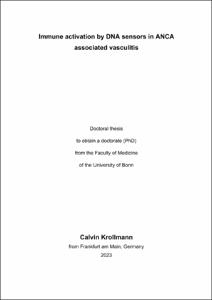Krollmann, Calvin: Immune activation by DNA sensors in ANCA associated vasculitis. - Bonn, 2024. - Dissertation, Rheinische Friedrich-Wilhelms-Universität Bonn.
Online-Ausgabe in bonndoc: https://nbn-resolving.org/urn:nbn:de:hbz:5-75142
Online-Ausgabe in bonndoc: https://nbn-resolving.org/urn:nbn:de:hbz:5-75142
@phdthesis{handle:20.500.11811/11389,
urn: https://nbn-resolving.org/urn:nbn:de:hbz:5-75142,
author = {{Calvin Krollmann}},
title = {Immune activation by DNA sensors in ANCA associated vasculitis},
school = {Rheinische Friedrich-Wilhelms-Universität Bonn},
year = 2024,
month = mar,
note = {Anti-neutrophilic cytoplasmatic antibody (ANCA) associated vasculitis (AAV) is a group of rare inflammatory autoimmune diseases primarily affecting the small vessels of kidney and lung. Current treatment options mainly involve broad immunosuppressive therapy, which is associated with severe side effects, including susceptibility to infection. A deeper understanding of the complex pathophysiology is needed to improve targeted therapy for patients. Neutrophils have been implicated in disease pathology, as they damage tissues. In AAV, neutrophils undergo NETosis, a process that releases DNA bound to antimicrobial peptides such as myeloperoxidase (MPO). ANCAs specifically bind to proteins like MPO, which is bound to the DNA released by neutrophils.
This thesis provides insights how nucleic acids by activating DNA sensors propagate signals and drive disease progression in AAV. By utilizing a murine model of pulmonary vasculitis, extensive release of nucleic acids could be detected upon induction of vasculitis. The released DNA was able to bind the nucleic acid sensor cGAS and induce the production of second messenger cGAMP. Accordingly, AAV patients displayed elevated levels of cGAMP compared to healthy donors. Complexation of MPO with DNA in vitro showed that MPO partially protected DNA from digestion. Moreover, addition of MPO antibodies significantly facilitated uptake of MPO bound to DNA in murine bone marrow derived dendritic cells (BMDCs). Stimulation of BMDCs with complexes of plasmid DNA, MPO and MPO antibodies resulted in upregulation of CD40, CD86 and release of pro- inflammatory cytokines. Data obtained from knockout BMDCs revealed that complexes shuttled to the endosomes where they were sensed through TLR9. Lastly, co-culture experiments with BMDCs and neutrophils showed that addition of MPO antibodies facilitate immune activation of BMDCs by neutrophil-derived DNA via TLR9. In summary, the data shows that in vivo, induction of pulmonary vasculitis triggers DNA release, which can activate the cGAS pathway. The in vitro data demonstrates how MPO antibodies protect DNA from degradation and facilitate their uptake and trafficking in AAV. These mechanisms lead to recognition of DNA by TLR9 and contribute to inflammatory responses and disease progression.},
url = {https://hdl.handle.net/20.500.11811/11389}
}
urn: https://nbn-resolving.org/urn:nbn:de:hbz:5-75142,
author = {{Calvin Krollmann}},
title = {Immune activation by DNA sensors in ANCA associated vasculitis},
school = {Rheinische Friedrich-Wilhelms-Universität Bonn},
year = 2024,
month = mar,
note = {Anti-neutrophilic cytoplasmatic antibody (ANCA) associated vasculitis (AAV) is a group of rare inflammatory autoimmune diseases primarily affecting the small vessels of kidney and lung. Current treatment options mainly involve broad immunosuppressive therapy, which is associated with severe side effects, including susceptibility to infection. A deeper understanding of the complex pathophysiology is needed to improve targeted therapy for patients. Neutrophils have been implicated in disease pathology, as they damage tissues. In AAV, neutrophils undergo NETosis, a process that releases DNA bound to antimicrobial peptides such as myeloperoxidase (MPO). ANCAs specifically bind to proteins like MPO, which is bound to the DNA released by neutrophils.
This thesis provides insights how nucleic acids by activating DNA sensors propagate signals and drive disease progression in AAV. By utilizing a murine model of pulmonary vasculitis, extensive release of nucleic acids could be detected upon induction of vasculitis. The released DNA was able to bind the nucleic acid sensor cGAS and induce the production of second messenger cGAMP. Accordingly, AAV patients displayed elevated levels of cGAMP compared to healthy donors. Complexation of MPO with DNA in vitro showed that MPO partially protected DNA from digestion. Moreover, addition of MPO antibodies significantly facilitated uptake of MPO bound to DNA in murine bone marrow derived dendritic cells (BMDCs). Stimulation of BMDCs with complexes of plasmid DNA, MPO and MPO antibodies resulted in upregulation of CD40, CD86 and release of pro- inflammatory cytokines. Data obtained from knockout BMDCs revealed that complexes shuttled to the endosomes where they were sensed through TLR9. Lastly, co-culture experiments with BMDCs and neutrophils showed that addition of MPO antibodies facilitate immune activation of BMDCs by neutrophil-derived DNA via TLR9. In summary, the data shows that in vivo, induction of pulmonary vasculitis triggers DNA release, which can activate the cGAS pathway. The in vitro data demonstrates how MPO antibodies protect DNA from degradation and facilitate their uptake and trafficking in AAV. These mechanisms lead to recognition of DNA by TLR9 and contribute to inflammatory responses and disease progression.},
url = {https://hdl.handle.net/20.500.11811/11389}
}





